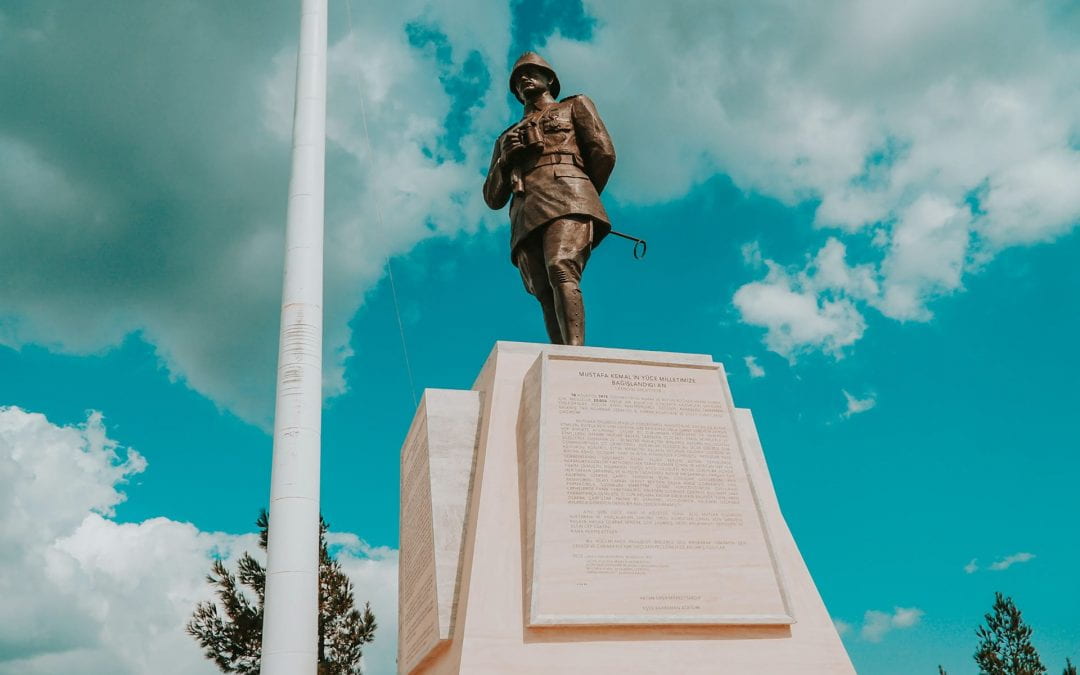By Maria Armoudian
Absent-mindedly paying tribute to murderous Turkish dictator Mustafa Kemal Atatürk is a stain on this country’s integrity. It’s time we did something about it, writes Maria Armoudian.
Last week, in what once seemed to many an impossibility, the towering tribute to a racist champion of the American Confederacy, General Robert E. Lee, was toppled in Virginia. Not by vandals but by the state. The historic move was just the latest in a series of actions by governments around the world—Britain, Belgium, South Africa, among them—to remove monuments to those unworthy of celebration.
When, then, will New Zealand take down its memorials honouring the genocidal Turkish dictator, Mustafa Kemal Atatürk?
Long heralded as a leader in human rights, this country led the world in giving women the vote, and now needs to face up to the profound error it made in erecting these monuments.
Since the mid-1980s, this small, compassionate country has forgotten a major piece of world history, as well as its own, and is, albeit perhaps unwittingly, contributing to the notion that brutality, ethnic cleansing, racism, and other crimes against humanity can be conveniently forgotten; and in fact, the perpetrators honoured in public places.
While other countries are acknowledging their racist histories and trying to make amends, New Zealand is still, through these monuments, celebrating genocidal racism, whether it realises it or not.
So, who was Mustafa Kemal Atatürk? He was a commander in the Ottoman Turkish army who helped defeat the Anzac soldiers in Gallipoli during World War I and is known as the father of modern Turkey, for modernising and secularising the country.
But in the guise of transforming Turkey into a new, more westernised world power, Kemal relied on the oldest evils of conquerors: a genocidal campaign to slaughter, burn, drown, destroy and remove the Indigenous people of the region and appropriate their homelands for his own.
Greeks, Armenians, and Assyrians, who had lived on those lands for thousands of years lost everything—lives, land, cultural heritage, as well as having the truth about these crimes acknowledged, the latter because of Kemal’s policy of genocide denial, which continues in Turkey today.
These facts can be found in New Zealand’s own newspapers of the time, which documented the mass killings while they were happening.
One paper in Oamaru, for example, noted that Kemal had made “no secret” of his plan to renew “the massacres of the Armenian … with the avowed aim of the extermination of their race”.
Kemal’s implementation of a genocidal “Turkey for the Turks” policy was a “shining star” for Adolf Hitler and the Nazis. As documented in Stefan Ihrig’s book, Atatürk in the Nazi Imagination, Hitler admired Kemal as “the greatest man of the century”. Indeed, Kemal’s exploits gave Hitler the confidence that his National Socialist movement, one that led to the extermination of six million people and the second World War, would triumph.
Yet New Zealand, a country that prides itself on its humanitarian, human rights record, still carved out and named a section of a sacred Māori Pā (burial ground) Atatürk Memorial Park at Breaker Bay in Wellington. It then erected the memorial in Tarakena Bay, bearing a quote that is falsely attributed to Kemal. This was all done despite the vociferous protests of its own citizens who demonstrated and advocated against it.
Why would New Zealand do this? In part, it was to reciprocate for Turkey renaming a portion of Gallipoli Anzac Cove to honour the soldiers who fell during the 1915 failed military campaign. Perhaps it was also part of its efforts to reconcile the losses of those men, and to build a national identity around Anzac commemoration. But a review of the record suggests it was largely about trade opportunities with Turkey, which didn’t quite materialise as hoped.
So now this decision carries a big price tag: New Zealand’s integrity and a stain on the country’s record that stands tall above the beautiful bay in Miramar Peninsula.
While this is consistent with New Zealand’s refusal to officially recognise the historical truths of the Armenian, Assyrian and Greek genocides, it contradicts the country’s other efforts to reconcile its own past.
That includes last year’s removal of the statue honouring British Captain John Fane Charles Hamilton, who killed Māori in the Waikato land wars, and the country’s other genocide recognitions, including Rwanda and Srebrenica.
Exalting Kemal while denying the genocides further soils New Zealand’s own honourable history. As documented most recently by Kiwi journalist James Robins, Australian researcher Vicken Babkenian, as well as in my own research, New Zealanders were in fact critical to rescuing and offering refuge and aid to the Armenian survivors of the genocide.
They raised money, drafted petitions, penned editorials, helped the running of refugee camps, and some even rescued victims. This history represents the real New Zealand, the one that I, as a human rights scholar, know and love. Absent-mindedly paying tribute to a murderous dictator is not a reflection of that country.
It’s time to do the right thing and remove these blots on the landscape.
This article was originally published on Newsroom and was republished with permission. For the original, click here.
Maria Armoudian is a Senior Lecturer in Politics and International Relations at the University of Auckland. She is an expert in media and politics.
Disclaimer: The ideas expressed in this article reflect the author’s views and not necessarily the views of The Big Q.
You might also like:
Killing orders: What are the facts of the Armenian Genocide and Turkey’s long-standing denial? ▶

